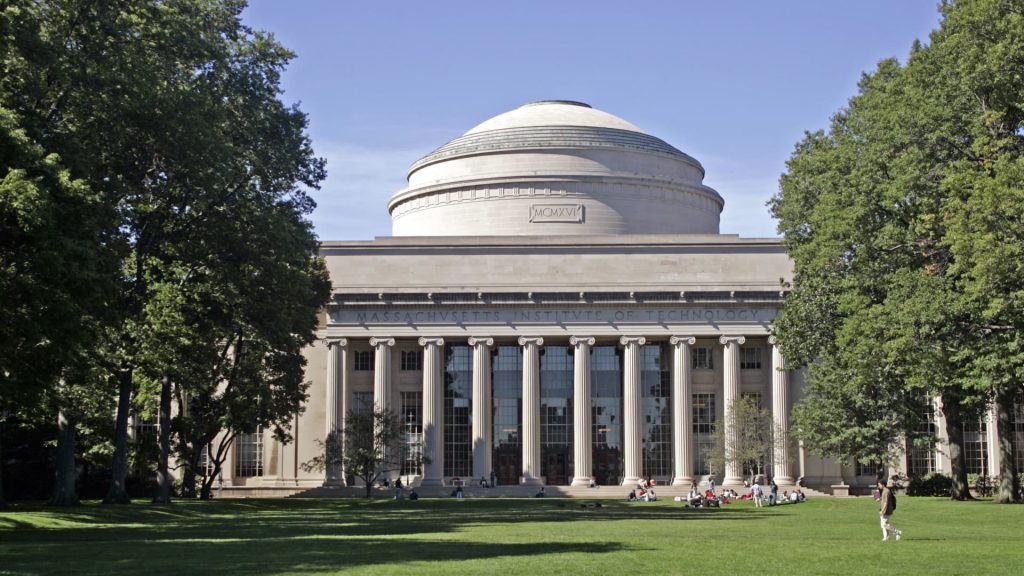Students on campus at Massachusetts Institute of Technology in Cambridge, Massachusetts.
Education Images | Universal Images Group | Getty Images
A group of universities — including Brown University and the Massachusetts Institute of Technology — and education groups filed a lawsuit on Tuesday seeking to halt the Department of Energy’s cuts to federal research grants.
Last week, the Energy Department (DOE) announced a new policy to reduce the funding of “indirect costs” of research grants to 15%.
However, the plaintiffs argue such cuts will “devastate scientific research at America’s universities” and “undermine” the nation’s status as a global leader in innovation.
“The pace of scientific discoveries in the national interest will be slowed,” the lawsuit says. “Progress on a safe and effective nuclear deterrent, novel energy sources, and cures for debilitating and life-threatening illness will be obstructed. America’s rivals will celebrate, even as science and industry in the United States suffer.”
The suit filed Monday in the U.S. District Court of Massachusetts claims the policy change is unlawful and violates the Administrative Procedure Act. It seeks an injunction.
Other plaintiffs include Cornell University, the University of Illinois, the University of Michigan, Michigan State University, Princeton University, the University of Rochester, the Association of American Universities, the American Council on Education, and the Association of Public and Land-Grant Universities.
This same court issued a permanent injunction earlier this year against a similar Trump administration research funding cut to the National Institutes of Health.
What are indirect costs?
The Energy Department provides over $3.5 billion annually through grant programs to more than 300 colleges and universities to support department-sanctioned research, the agency said in a news release.
Some of that goes to “direct costs,” such as specific projects, and some to “indirect costs,” which aren’t attributable to a specific project, such as facilities and administration.
The complaint said indirect costs are essential to scientific work, including specialized nuclear-rated facilities, computer systems to analyze huge volumes of data, researchers and administrative staff.
Indirect cost rates for grants follow regulations laid out by the Executive Branch’s Office of Management and Budget (OMB) and are negotiated by federal offices — with each recipient to fit their circumstances and needs. The complaint argues that the Trump administration’s DOE Rate Cap Policy violates those regulations and that indirect cost rates should not be a “one-size-fits-all” policy.
Meanwhile, the DOE argues that the new policy will generate over $405 million in annual cost savings.
“The purpose of Department of Energy funding to colleges and universities is to support scientific research — not foot the bill for administrative costs and facility upgrades,” U.S. Secretary of Energy Chris Wright said.
The complaint said the policy’s effects “will be immediate and devastating.”
“Because universities cannot sustain DOE-funded programs at the 15% indirect cost rate that DOE will now inflict, myriad critical projects — often the product of years or decades of effort — are in jeopardy of being stopped in their tracks. These include the development of advanced nuclear and cybersecurity technologies, arms control verification mechanisms designed to reduce the risk of nuclear war, novel radioactive drugs to diagnose and treat cancer, and upgrades for the electrical grids that keep the lights on in rural communities, among many others,” the complaint said.
The complaint said it would also result in reduced staffing and training programs, damage careers, and impact the next generation of scientists.
Under the cuts, Brown University would lose over $2 million annually to its planned research budget, Caltech would lose nearly $6 million, and Cornell University would suffer “a shortfall of roughly $8 million in a typical fiscal year.”
MIT received $93 million from the DOE in the fiscal year 2024 for sponsored research. This year, if DOE reduces indirect costs rates to 15%, “then MIT forecasts it will lose approximately $15 million to $16 million in reimbursement for costs that support DOE research over the next 12 months alone,” the complaint said.
The complaint alleges that the cuts violate several aspects of the Administrative Procedure Act and asks the court to find the Rate Cap Policy invalid and order an injunction.
‘It would be a self-inflicted wound and a gift to competitors’
NBC News has reached out to the DOE for comment. The suit also names DOE Secretary Chris Wright as a defendant.
The American Council on Education said in a statement that the administration cuts “would have an immediate and dire impact on critical energy, physical sciences and engineering research nationwide.”
The group argued that the slashed funding would weaken America’s economic opportunities, workforce pipeline, and families’ prosperity.
“It would be, quite simply, a self-inflicted wound and a gift to competitors and potential adversaries such as China,” the group said.
“We will continue to take the action necessary to protect the essential funding that supports Brown research and our country’s need for innovative solutions to critical problems,” Brown University President Christina H. Paxson said.
MIT President Sally Kornbluth said in a statement that DOE grants support the work of nearly 1,000 school community members.
Meanwhile, Cornell officials said, “arbitrarily cutting indirect costs will cause irreparable harm to Cornell’s research enterprise, paralyze progress on projects of national importance, and threaten the training of the next generation of energy scientists.”

